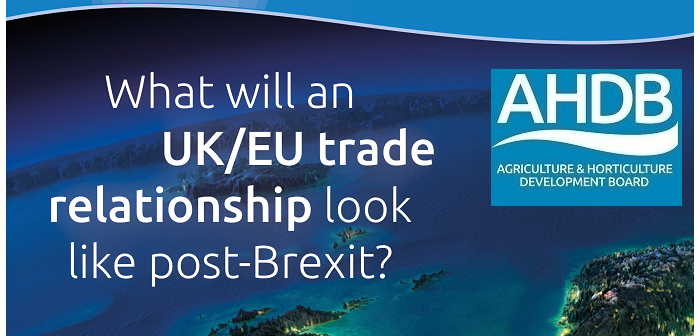The Agriculture and Horticulture Development Board (AHDB) has published an analysis of five possible trading relationships between the UK and the EU post-Brexit, outlining the pros and cons of each.
“There is a huge thirst for knowledge out there as we stand on the brink of a new era for UK agriculture,” said AHDB‘s head of strategic insight, David Swales. “Obviously at this stage we can’t give any definitive answers but we can paint a picture of what the future may look like for our levy payers.”
The eight-page analysis is the first of a series of articles which AHDB is planning to produce, examining the implications for the agricultural industry of the UK’s decision to leave the EU.
The post-EU options which are explored consist of the systems currently being operated in Norway, Switzerland, US/Canada and Turkey. The article also examines what it would be like to operate under a World Trade Organisation agreement.
There’s also a section headed ‘Which option is likely to be chosen?’ which accepts that the UK has not yet defined the type of relationship it intends to seek but which draws on signals given by the various leave campaigners during the run-up to the referendum.
“Senior leave campaigners signalled that the UK should continue to access the Single Market at the same time as leaving the EU,” it is stated. “It is unclear from this whether their intention is/was to retain the UK’s trading status within the Single Market or seek access on a ‘bilateral’ trading basis.
“Though this distinction may seem subtle, it is fundamental to determining whether the UK would be bound by EU principles, especially free movement of goods, labour, services and people.
“If the UK seeks to negotiate on a similar basis to Norway – as a full trading partner in the Single Market – it will benefit from free movement of goods but must also accept free movement of labour and also EU regulatory burdens that bind the Single Market together.
“Some Leave campaigners hinted at a preference for a bilateral trading model similar to the trade agreement that Canada has negotiated with the EU, albeit with much greater market access. This may enable greater control over free movement from the EU, which has also been a central pillar of the Vote Leave manifesto.”
AHDB also points out, however, that in the course of the obligatory two-year negotiation period to determine the new UK/EU relationship, the importance of the UK as a destination for EU trade means, on balance, individual EU member states are likely to want terms which will not strongly disadvantage their own UK trade relationship.


